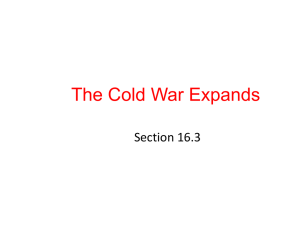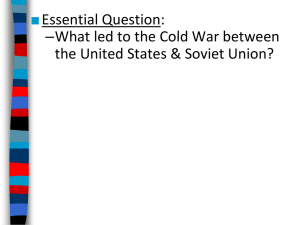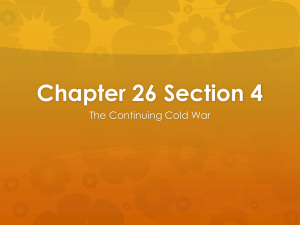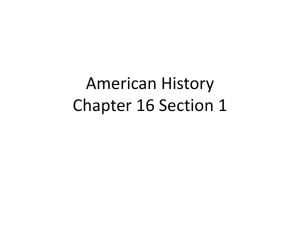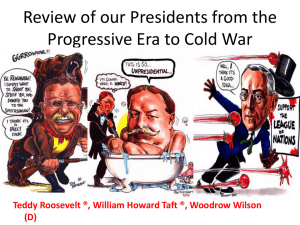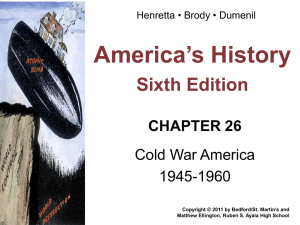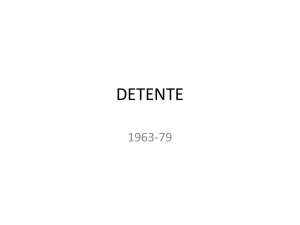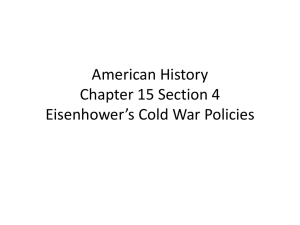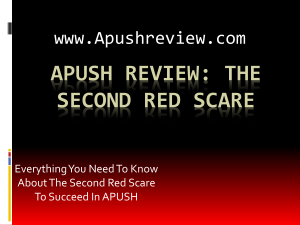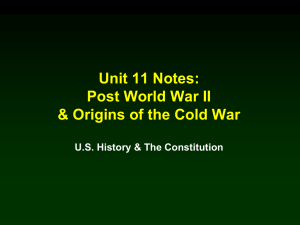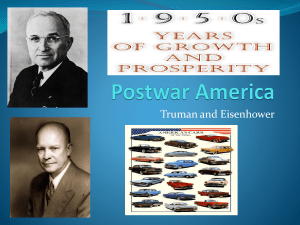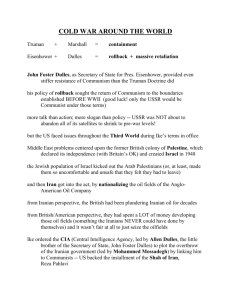Red Scare
advertisement
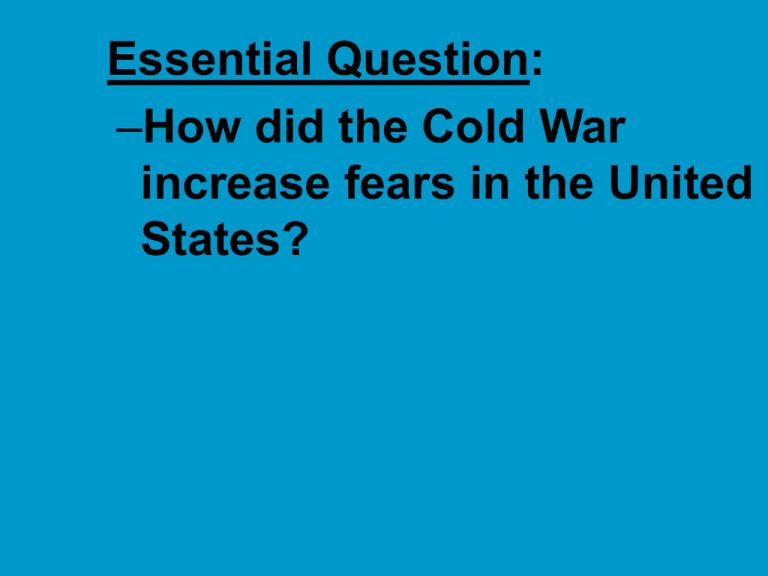
■Essential Question: –How did the Cold War increase fears in the United States? The Cold War by the 1950s ■ In the 1950s, Cold War tensions led to anxiety & fear in America: –The USSR dominated Eastern Europe & China fell to communism –The Korean War almost led to a full-scale war with China –The U.S.-Soviet atomic arms race led to fears of a nuclear attack –The discovery of Soviet spies in the U.S. led to a new Red Scare The Red Scare From 1947-1951, 3.2 million gov’t employees were investigated & 212 as security ■During thewere Reddismissed Scare, the gov’t risks (2,900 resignedconcerned rather than face investigation) became about the growth of communism in America –The Loyalty Review Board was created to investigate & dismiss “disloyal” gov’t employees –The House Un-American Activities Committee (HUAC) investigated suspected communists in the entertainment & other industries In 1947, numerous Hollywood writers & executives were investigated by HUAC; 500 were blacklisted from the film industry & some were sent to prison for refusing to testify (the “Hollywood Ten”) The Red Scare ■Red Scare fears in America were heightened by the discovery of spies working for the USSR: –State Dept employee Alger Hiss who was eventually convicted of spying for the USSR –Ethel & Julius Rosenberg were convicted & executed for passing atomic bomb secrets to the USSR Alger Hiss Julius & Ethel Rosenberg McCarthyism Activity ■Examine the document titled “McCarthy’s Telegram to Truman” & answer the questions provided ■After a brief class discussion, read “Truman’s Response” & answer the questions provided McCarthyism ■In 1950, Wisconsin Senator Joseph McCarthy emerged as the leader of anti-Communism in the U.S. –He attacked Truman & the Democrats for allowing communists to infiltrate the gov’t –He used public trials to make unsupported accusations against suspected communists in the State Dept & the U.S. military McCarthyism in Action ■McCarthy’s attacks lasted 4 years –But “McCarthyism” did not result in a single confirmed Communist or spy in the U.S. gov’t –McCarthy was briefly popular but by 1954, the Senate & American public grew tired of his bullying techniques & McCarthyism faded ■Essential Question: –How did the Cold War evolve by the 1950s & how did President Eisenhower respond to these foreign policy challenges? ■Warm-Up Question: –What was the Red Scare? –What was HUAC? –How did Joe McCarthy increase the tensions of the Red Scare? Eisenhower & the Cold War ■In 1952, World War II hero Dwight Eisenhower was elected president –At home, he tried to promote the “good times” of the 1950s economic boom –In foreign policy, he took a strong stand against Communism Brinksmanship ■Eisenhower began a “New Look” to fight the Cold War: –He invested heavily in new longrange nuclear missiles (ICBMs) –In foreign policy, he used veiled threats of nuclear war to achieve his goals (called brinksmanship) –In case of a Soviet attack, the U.S. would use “massive retaliation” thus making the use of nuclear weapons unlikely on either side Nuclear submarines The stockpiling of ICBMs What are the stakes of war? Massive Retaliation? Mutual Assured Destruction? Americans were anxious by the threat of nuclear war & built fallout shelters for protection Eisenhower & the Cold War ■In response to the threat of a Soviet nuclear attack, Eisenhower pushed Congress to create the Interstate Highway System in 1956 –41,000 miles of divided highway to connect major U.S. cities –In addition to helping promote trade & travel, these highways were vital to evacuate cities during a nuclear attack Interstate Highway System Covert CIA Operations ■In addition to relying on nuclear weapons, Eisenhower increased the role of the CIA in foreign policy –The CIA spied on foreign nations & carried out covert operations to weaken communist governments –The CIA led successful coups in Iran & Guatemala and tried to overthrow Fidel Castro in Cuba In 1957, the president issued the Eisenhower The Eisenhower Doctrine Doctrine, pledging the USA to protect the ■ After Stalin’s in 1953, new Middle East death from Communism Soviet leader Nikita Khrushchev began to challenge U.S. influence: –In 1955, the USSR formed the Warsaw Pact alliance –In 1956, the Soviet military violently suppressed an anti-communist revolt in Hungary –In 1956, the USSR began to make moves towards the Middle East Sputnik & the Space Race ■ In 1957, the USSR launched the 1st space satellite, Sputnik I –People feared that the U.S. had lost its competitive edge –The National Aeronautics & Space Advanced placement (AP) classes Administration formed were created as a(NASA) result ofwas the NDEA in 1958 to catch up to the Soviets –National Defense Education Act was created to promote math, science, & technology education The “space race” intensified the The Original Seven NASA Mercury Astronauts Cold War between USA & USSR Eisenhower & the Cold War ■ Eisenhower failed to thaw the Cold War by the end of the 1950s: –In 1960, an American U-2 plane was shot down over the USSR proving we were spying on Russia –He was unable to negotiate with the USSR weapons reduction –Before leaving office, he warned against overspending on defense (“Military Industrial Complex”) Francis Gary Powers & the U-2 Incident Conclusions ■ By 1960, the Cold War remained the major focus of U.S. foreign policy –Truman contained communism in Europe while Eisenhower used the CIA & brinksmanship to limit Soviet global influence –But, Americans remained anxious due to McCarthyism, threats of nuclear war, & increasing gov’t spending on defense Closure Activity ■Compare & contrast the Cold War policies & actions of Presidents Truman & Eisenhower: –List the events and/or policies that each president faced –When you compile your list, which president was the better “Cold Warrior”? Explain ■Read A U2 is Shot Down (p. 626-627) ■Write 1 paragraph describing the incident and its role in the Cold War.
